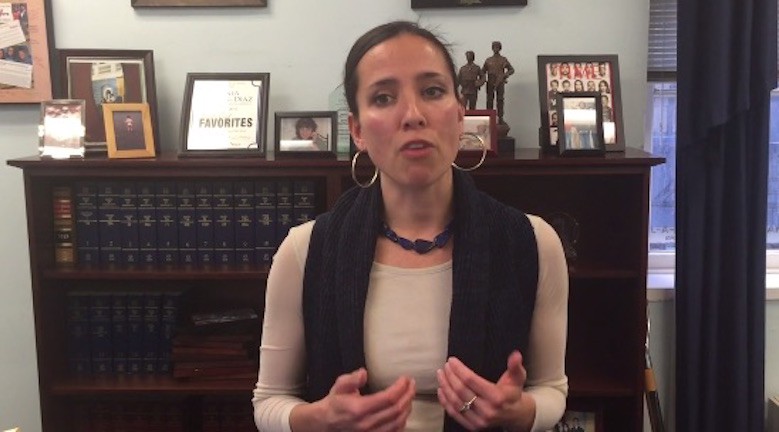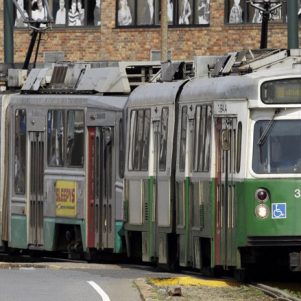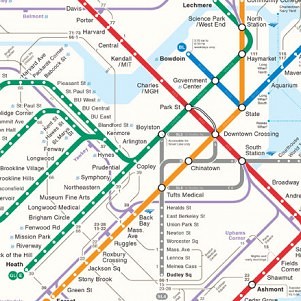Fare hike proposals draw fire from T critics in Roxbury
By Derrick Perkins | February 11, 2016, 1:12 EST
 State Sen. Sonia Chang-Diaz spoke out against proposed MBTA fare hikes before Wednesday’s hearing in Roxbury. (Image courtesy of Sonia CHang-Diaz)
State Sen. Sonia Chang-Diaz spoke out against proposed MBTA fare hikes before Wednesday’s hearing in Roxbury. (Image courtesy of Sonia CHang-Diaz) ROXBURY – Mass transit riders, students, activists and a trio of local lawmakers lambasted the Massachusetts Bay Transportation Authority’s proposal to raise fares by as much as 9.7 percent at a public hearing Wednesday in Boston.
The public hearing, held at Roxbury Community College, was one of several the transit agency is holding across the region as it weighs increased fares to combat a massive budget deficit. Officials project a $242 million shortfall in fiscal 2017 even as they seek to rebuild the system’s reputation after it ground to a halt amid last winter’s record snow.
Increasing fares on average between 6.7 percent and 9.7 percent – there are two options on the table – could raise annual revenue by about $33 and $49 million above what the system pulled in during fiscal 2015, officials said. Still, the proposal has provoked a backlash across greater Boston.
“Fare increases, for us, are really a last resort,” Brian Shortsleeve, the MBTA’s chief administrator, told a crowd of about 100 in the school’s media arts building before opening the meeting up to public comments. If one or the other fare hike option wins legislative approval in March, the cost of riding in buses, subways, street cars and commuter trains would rise starting July 1.
But his words did little to assuage those gathered to speak out against the plan, including state Sen. Sonia Chang-Diaz, state Rep. Evandro Carvalho, both Boston Democrats, and City Councilor Tito Jackson of Roxbury.
All three joined a chorus of voices opposed to the hikes for a variety of reasons, from overpricing a public good to imposing a disproportionate cost on the city’s disabled, disadvantaged and communities of color.
“Racial minorities will bear an increased burden on funding our transportation service,” Carvalho said.
Chang-Diaz, who has come out strongly against the proposed hikes, said the transit agency and state government were losing touch with the region’s impoverished residents.
“The challenge of imagining, of understanding what it is like to be poor, very few people can stretch imagination” that far, she said.
Parents will be forced to choose between going to work and giving their children fare money to get to school, Chang-Diaz warned. Already, school principals have reported that children are missing class because they can’t afford the bus or subway ride, she said.
Student five-day and seven-day passes would rise 23 percent under either option under consideration. That’s the largest increase out of all the proposed changes – a “slap in the face to your best customer,” Jackson said.
Others criticized the proposed increases as regressive by taking the greatest percentage of income from the pockets of the poorest riders, aiding gentrification as a result. Some faulted the process for setting the fares as undemocratic. The transit agency’s Management Control Board, which came up with the revenue roadmap, is made up of five members appointed by Republican Gov. Charlie Baker.
Critics alluded to what had been briefly a sticking point: whether or not the MBTA could raise fares by more than 5 percent every two years. The language of a pre-existing fare hike cap gave opponents hope last year that any increases would be limited to that rate, but state officials have asserted that the wording allows a hike of up to 10 percent every two years.
But the heated rhetoric left at least one audience member perturbed. Mike Freedberg said that while he agrees a nearly 10 percent fare hike is too much, he was disappointed in the lack of viable alternatives proposed by critics.
“I still didn’t hear anything in here that will help,” Freedberg said.










